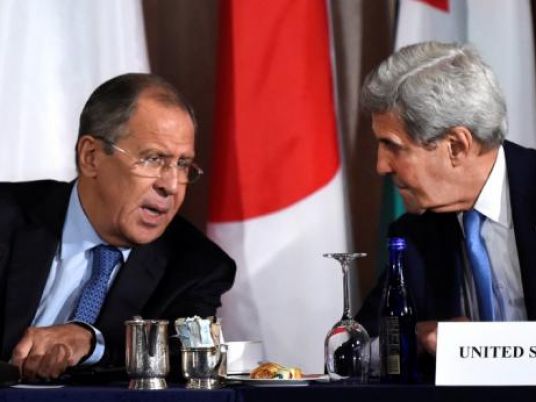
US Secretary of State John Kerry said Sunday his country is committed to working with Egypt's interim rulers, on his first visit to Cairo since the army ousted president Mohamed Morsy.
On the eve of the opening of Morsy's trial, Kerry was in Cairo to shore up ties with a key ally and ensure it moves ahead on plans to restore democracy just weeks after Washington suspended aid to the country.
"We are committed to work and we will continue our cooperation with the interim government," Kerry told a joint news conference with Egyptian foreign minister Nabil Fahmy, urging "inclusive, free and fair elections".
"The United States is a friend of the people of Egypt, of the country of Egypt, and we are a partner," he said.
Kerry also played down Washington's suspension just weeks ago of part of its $1.5 billion in annual aid to Cairo.
"US-Egyptian relations should not be defined by assistance," Kerry said, adding direct aid would continue to Egyptians and to help efforts to "counter terrorism".
In a move that angered Cairo, Washington last month said it was "recalibrating" aid to Egypt — including about $1.3 billion for military assistance — and suspending delivery of items like Apache helicopters and F-16 aircraft.
Kerry — the most senior figure of the US administration to visit since Morsy's July ouster — will also meet interim president Adly Mansour and powerful military chief Abdel Fattah al-Sisi.
The top US diplomat said Washington believed "the US-Egypt partnership will be strongest when Egypt is represented by a democratically elected government".
He condemned violence since Morsy's ouster, but said nothing about Morsy himself.
"I want to say very, very, very clearly: the United States condemns all acts of violence… against churches, against worshippers… in Sinai … in the streets of the country," Kerry said.
More than 1,000 people have been killed in Egypt as security forces engage in a sweeping crackdown against supporters of Morsy who have tried to stage near daily protests against the Islamist president's ouster.
'Egypt positive'
Fahmy, who has previously criticised the aid suspension, offered a more upbeat assessment of US-Egyptian ties on Sunday.
"I said a few days ago that Egyptian-American relations were tense, and I believe after my talks with the US secretary of state today that there are good indications that we seek to resume these relations in a positive manner," said Fahmy.
The United States had for three decades supported Morsy's predecessor Hosni Mubarak, who was ousted by a popular uprising in 2011, relying on Egypt to help maintain stability in the volatile region.
Morsy, a Muslim Brotherhood member who became Egypt's first democratically elected president, was toppled by the military on July 3 after a single turbulent year in power that deeply polarised Egyptians.
According to the interim government's timetable, parliamentary elections are to be held by mid-2014 followed by presidential polls.
Kerry's visit is the first stop on a packed 12-day trip which will also take in Saudi Arabia, Israel, Bethlehem, Jordan, the United Arab Emirates, Algeria and Morocco.
The aim of squeezing in a Cairo stop was to examine progress on "issues that are important to the United States" such as freedom of assembly and the press, protection of minorities, the participation of civil society and human rights.
The US would be informed by "a constant review of progress to help us understand how well the Egyptians are moving along their roadmap (and) when it's appropriate to lift some of the holds that we have on the equipment," a senior State Department official said.
The timing of the visit is awkward however, coming on the eve of Morsy's trial, with 14 others, on charges of inciting the murder of protesters outside the presidential palace in December 2012.
Washington has called for Morsy's release and an end to politically motivated trials but has also stopped short of denouncing his ouster as a coup.
"Mr Morsy proved unwilling or unable to govern inclusively, alienating many Egyptians," Acting Assistant Secretary Beth Jones said last week.
The military had responded to "the desires of millions of Egyptians who believed the revolution had taken a wrong turn," she added.




